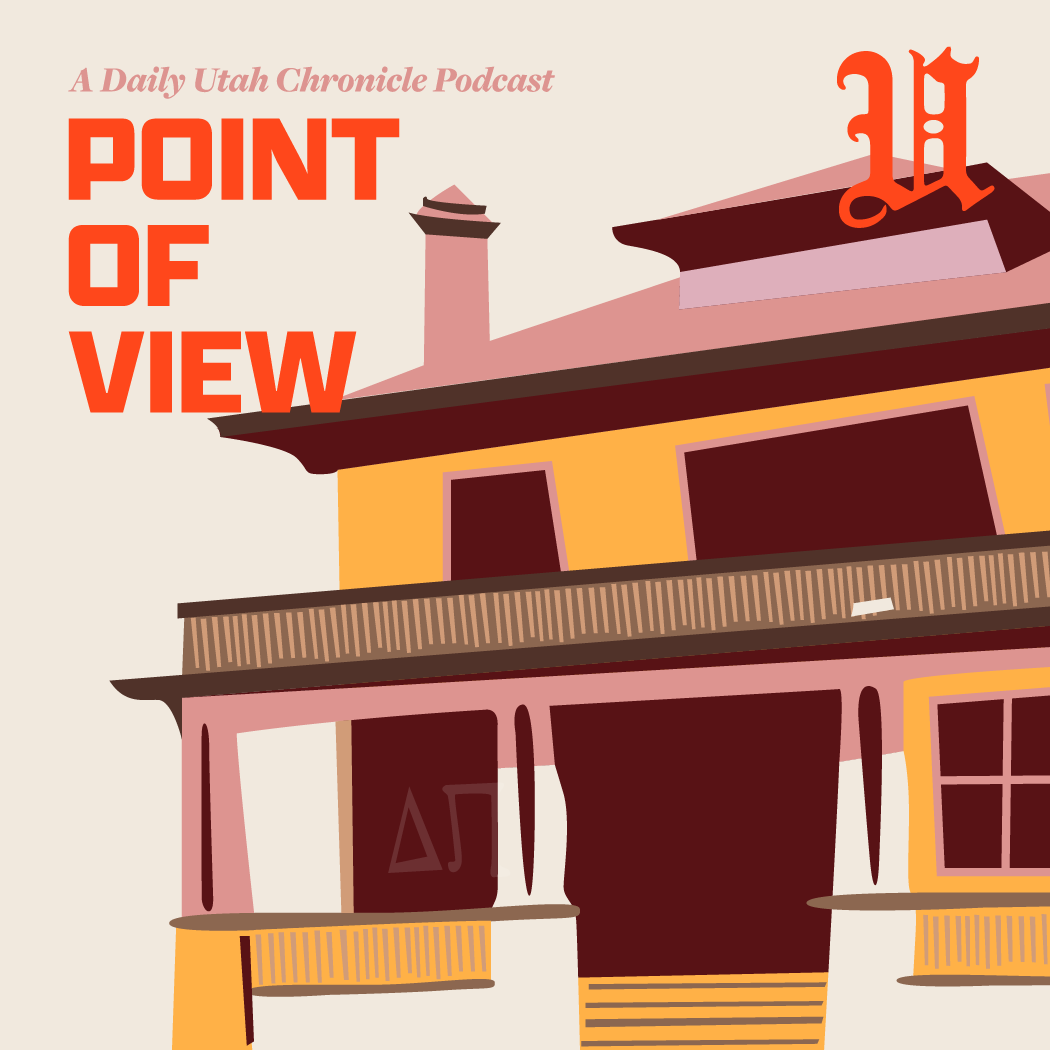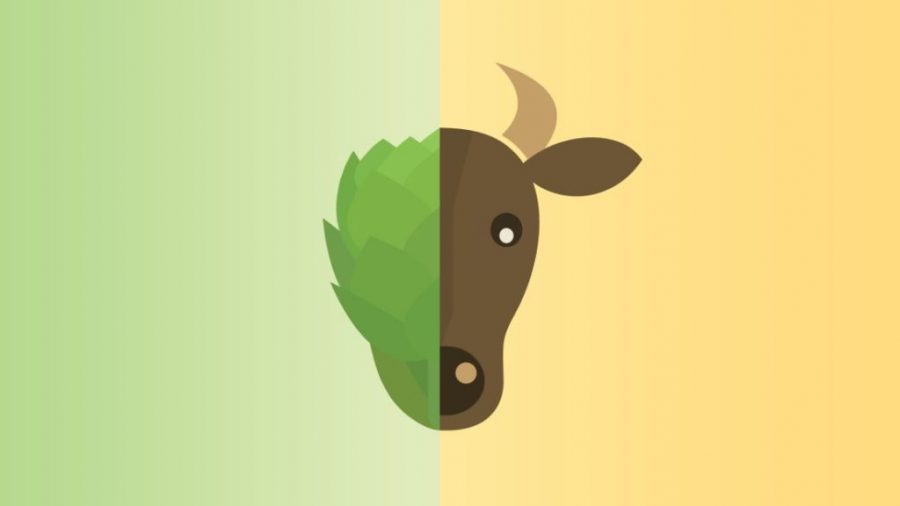The environment is experiencing severe ecological devastation. Tropical species are on the decline, deforestation is rampant and American homeowners leave their sprinkler systems on continuously. Perhaps, as a conscientious steward of the planet, you’ve chosen to drive less or reduce water consumption. These small acts of material conservation will save the Earth from destruction, right? Well, despite environmental nonprofits asserting that climate change is caused by industrial expansion, the driving force behind climate change is something much simpler — meat production.
Let’s begin with the United States, which is known universally for its excess as a nation. According to The New York Times in 2015, “Per capita carbon dioxide emissions in the United States are about twice those of the other wealthy nations of the 34-member Organization for Economic Cooperation and Development. American obesity…is running at about twice the European average and six times the Japanese.” Those figures are rather alarming, and the situation has only worsened in the past two years. The fuel behind this overconsumption is a mix of cultural factors.
While Americans are generally optimistic about the capacity of technology to resolve any issues, the issues related to agricultural production are inescapable. Regardless of sprawling cities and landmark destinations, the U.S. is essentially one massive farm. The World Bank projects that in the U.S. alone, nearly 44.6 percent of the land is used for agriculture. Furthermore, more than 260 million acres of forest have been cleared for animal production, which accounts for “approximately 80 to 90 percent of U.S. consumptive water use,” according to the USDA. Globally, as Time Magazine reports, “Some 40 percent of the world’s land surface is used for the purposes of keeping all seven billion of us fed…And the vast majority of that land — about 30 percent of the word’s total ice-free surface — is used…to support the chickens, pigs and cattle that we eventually eat.” Therefore, while this industry has facilitated U.S. population growth, the pervasive nature of agriculture magnifies its effect on the environment.
Over the past several decades, there have been numerous efforts to reverse deforestation. Yet, as NPR reports, “from August 2015 to July 2016, the Amazon rainforest was deforested at an estimated rate of 7,989 square kilometers (more than 3,000 square miles). The year before, it was 6,207 square kilometers. Two years ago, it was barely over 5,000 square kilometers.” Although wood-related production contributes to this trend, the World Bank found that animal agriculture is responsible for “91 percent of Amazon destruction, with one to two acres of rainforest being cleared every second.” Encompassing vast swathes of Venezuela, Colombia, Brazil, Peru and Ecuador, the Amazon is equivalent to the ninth largest country in the world.
The increasing consumption of meat comes at a high cost. Each hamburger that originates from animals raised on rainforest land destroys approximately 55 square feet of forest. PBS reports that citizens in the U.S. consume nearly 50 billion burgers per year. The overconsumption of meat is damaging to health, as overindulgence can cause heart disease, cancer and obesity. According to the Scientific American, “…between 1971 and 2010, production of meat tripled to around 600 billion pounds while global population grew by 81 percent, meaning that we are eating a lot more meat than our grandparents.” With meat consumption projected to double by the year 2050, the environment will be severely strained for years to come.
Meat consumption affects more than just land — it also impacts the water. As Georgetown Law Review wrote, “…animal agriculture is the number one consumer of fresh water by a significant margin. Animal agriculture consumes on average 55 trillion gallons of water annually…On a micro level, it takes roughly 5,000 gallons of water to produce one pound of beef.” The harmful repercussions of meat consumption also extend into the water, contributing heavily to climate change. Overfishing has destroyed wildlife, leading to a general depletion of freshwater resources. The Food and Agriculture Organization of the United Nations (FAO) found that approximately 75 percent of the world’s fisheries are either exploited or depleted due to fishing. This will eventually culminate into a complete depletion of the areas currently fished by 2048, which could cause widespread panic amongst an expanding population.
While these figures are damning, they likely come as a surprise, even for those concerned about conservation. Despite the clear link between animal agriculture and environmental destruction, nonprofit organizations are hesitant to speak about the issue. In 2014, an award-winning documentary called “Cowspiracy” was released by a pair of veteran filmmakers. The film highlights various environmental groups — such as the Sierra Club — and their hesitancy to discuss animal agriculture. Indeed, the directors discovered that the animal industry is the de facto “third-rail” of food production — so ubiquitous that criticizing the practice would lead to a loss of support. Nonprofit agencies, which struggle to urge citizens to use less water, are afraid of acknowledging animal agriculture. Who would even try telling skeptics to cut meat out of their life?
Instead, nonprofits push for citizens to drive less, which is certainly a noteworthy goal. Yet, emissions from transportation vehicles pale in comparison to animal production, as the FAO also found that animal agriculture is responsible for 18 percent of greenhouse gas emissions. That is more than the combined exhaust from all transportation, which accounts for only 13 percent of greenhouse gas emissions. Furthermore, livestock are responsible for 65 percent of the emissions of nitrous oxide, which is 296 times more damaging to the planet than carbon dioxide. So, while driving less is one small step towards environmental conversation, it’s rather insignificant. To save the environment and preserve limited resources we need to greatly reduce the consumption of meat.
There are numerous types of diets that accomplish this goal, but the only one that completely eliminates animal products is a vegan diet. Even vegetarian diets contribute to the industry, as it allows for eggs and milk, which take hundreds of gallons of water to produce. University of Oxford researchers Peter Scarborough and Paul Appleby studied the benefits of various diets, and came to the conclusion that “dietary [greenhouse gas] emissions in self-selected meat-eaters are approximately twice as high as those in vegans. It is likely that reductions in meat consumption would lead to reductions in dietary GHG emissions.” Indeed, the largest influence that one can have on the environment isn’t using fewer material resources; instead, the key is to consciously avoid animal products altogether. Despite the immense amount of research that supports this notion, it’s important to remember one fact: meat consumption is the third-rail of food.
Reducing material consumption, such as turning off a sprinkler system, is a goal that everyone gets behind — regardless of political affiliation. These simple recommendations draw validation from friends and family. Driving less and choosing to walk or bike more is a rewarding practice. Yet, when it comes to actually saving the environment through dietary change, anger swells from even the staunchest environmentalists. It’s too much to ask, which is why nonprofits shy away from the issue. Vegans are cast as antiestablishment bigots. But understand that a vegan diet produces the equivalent of 50 percent less carbon dioxide, and uses 1/11 of the oil, 1/13 of the water and 1/18 of the land of meat production; the choice is clear. To truly address ecological devastation, and sustain the Earth’s expanding population, switching to a predominately vegan diet is not only important — it’s necessary.











Penelope • Dec 24, 2018 at 10:19 am
Loved the exchange between Nathaniel and Stewart. Thank you both for remaining respectful while expressing your views. I’ve been passionate about sustainability and nutrition for a long time and more recently become conflicted about both subjects – how is this possible? I even went vegan and found it more difficult than everything I had been reading claimed. As a student of Urban Planning, it’s unrealistic to suggest the population should hunt and forage their own food, as wonderful as that sounds. I especially appreciate the article Stewart suggested. Very interesting, and will hopefully continue my search to a holistic answer personally, if not more. Because I do agree with what Stewart said, “Veganism understates the problem and overstates the solution with the single directive Eat No Meat”. The search continues to better our world and our health…
Elle • Apr 24, 2017 at 2:29 pm
Spot on article!
Nigel Franks • Apr 24, 2017 at 1:26 pm
I’m exasperated by non-vegans who claim that is too difficult to follow a vegan diet safely, yet they themselves are obese, have high blood pressure and have an increased risk of a stroke or type two diabetes. They clearly don’t realise that their own diet is not safe.
Christie K • Apr 21, 2017 at 6:49 pm
This column is the most concise yet comprehensive analysis of the situation I’ve seen anywhere. As for the discussion, I’ve been lamenting how comments boards have been devolving into an anonymous platform from which people feel free to disorge all their bile and vitriol onto anyone who disagrees with their negativity, saving their most toxic attacks for those who seek understanding and enlightenment.
I can’t express how much I enjoyed the intelligent, well-researched, and civil discussion I just read. I learned so much and gained so much insight into both sides (though I have to say, were I a debate judge, I’d have to go with the vegan arguments) ;o) Thank you for a rare and genuine experience. I hope to see more of the same in this publication.
isabelle Crosby • Apr 19, 2017 at 12:27 pm
This is one of the best columns that I have ever read! Thank you very much.
Jeremy Beckham • Apr 19, 2017 at 10:51 am
Thanks for this well-written column. As someone who has been vegan for more than 15 years, it can be maddeningly frustrating to see how much societal resistance there is to making the switch away from eating meat, dairy, and eggs. It is such an easy solution to so many global problems – climate change, resource conservation, animal suffering, many widespread chronic health conditions, antibiotic resistance, etc. When we all finally get on the same page, I think we’ll look back in confusion that it took people so long to see the obvious solution staring them in the face.
stewart lands • Apr 18, 2017 at 9:48 pm
Few will deny that most Americans consume too many calories–meat and dairy products included. We also consume far too many unhealthy plant-based products such as chips and cookies. Vegan or not, many of our preferred foods contain far too much sugar and oil.
Most of us would be better off if we consumed more whole plant foods, as would our environment. But, this is not to say that the elimination of all meat from one’s diet is good for health, or for the environment. Just as the health of many non-vegans suffers from insufficient plant intake, many vegans suffer from too little of the nutrients available in meat. If the question is one of health, then perhaps a reduced meat diet is the better option than either extreme–and especially those meats low in fat and rich in the sorts of nutrients our bodies need more of–such as fish. Also, those concerned about processed foods may be reluctant to consume vegan foods engineered to replicate meat-based products.
When it comes to environmental health, the least destructive outcome is recognized to be that which supplements a plant-based diet with a small amount of milk, eggs and meat. Most plants are not entirely edible, and it makes sense to feed the inedible parts to chickens or livestock and thereby increase the number of meals grown on any single acre. If we are to consume corn anyway, then why not feed the stalks to livestock rather than waste them? Ultimately, the greatest source of animal extinction and environmental degradation is agriculture, and to the extent that we may reduce the number of acres under production in order to improve the health of the ecosystem, the better off we and our environment will be.
Veganism understates the problem and overstates the solution with the single directive Eat No Meat. Some sources of meat are less destructive than any form of agriculture–including plant agriculture. Consider the trout pulled from a local stream. To consume this animal has no impact on the trout population over the long term and the meal generates no habitat loss or degradation whatsoever. Now consider, instead, a vegan meal of rice and beans, etc. and the fact that the simple act of growing such crops requires the elimination of every wild animal on the lands converted to crop fields. Unlike well-regulated fishing (or hunting) which consumes only the excess in any animal population that can be expected to regenerate with the next generation, plant agriculture results in the loss of every individual, of every future generation, of every species, on the lands converted to that purpose. The fact that many vegans consider their life style “cruelty free” demonstrates how little understanding there is of these losses (or, is it “wilful ignorance”?).
In short, the simple Eat No Meat solution lacks the nuance necessary to maximize either human or environmental health. This is not to say that a whole plant diet is not superior to the average American diet in these regards, but only that there are even better options available to us that include meat, albeit reduced. The portrayal of only two options–the Average Joe diet v. the Vegan diet–is an irresponsible effort that fails to maximize the very outcomes veganism claims to prioritize. But, of course, veganism is not really about health–it is about establishing equity between the rights of animals and human beings–and this truth is often overlooked in the hurry to dress up the movement.
Nathaniel Ellingson • Apr 19, 2017 at 10:28 am
@Stewart Lands
That is a very thoughtful and well written comment. However, I think you are not understanding the entirety of a vegan’s perspective. While concern for the environment is certainly one of the most important issues on a vegan’s mind (it certainly is for me) the MOST important issue is the well being of the animals themselves. That includes every species, from fish and crabs to cows and chickens. While there is certainly room for debate as to whether a vegan’s diet is “most healthy” it certainly cannot be denied that eliminating meat entirely is far, far better than the average American’s diet (high in red meat, fatty cheese, etc.). You are probably assuming that I am missing out on protein and B12 vitamins, but I assure you this is not the case so long as one is attentive to their diet, or simply takes a vitamin supplement.
I understand that a lot of people simply do not believe or agree with the idea that animals have the right not to be killed and to live free, natural lives, but please understand that this is where vegans are coming from fundamentally.
You said “If we are to consume corn anyway, then why not feed the stalks to livestock rather than waste them?”
You are falsely assuming that animals are only fed the in-edible waste product of corn production. The reality is that about 40% of corn is used for biofuels (hopefully we’ll switch to solar in the future), 36% is used for animal feed, and the rest is used for human consumption. If we eliminated animal products from our diet, that 36% could potentially go to reducing human hunger around the world. Instead it is used to maintain unnaturally large populations of livestock that live their entire lives in miserable conditions, releasing methane into the atmosphere in the process.
You said “Consider the trout pulled from a local stream. To consume this animal has no impact on the trout population over the long term and the meal generates no habitat loss or degradation whatsoever.”
First I will remind you that vegans fundamentally reject the killing of animals, even trout. Second, the trout population cannot support the human population. The entire population of wild animals that are hunted (boars, trout, deer, etc.) could not support the entire human population (remember the dodo bird?). Plants can. While I would certainly agree that if every person on Earth hunted in the wild for every single animal product they consumed that would be much better for the environment, and would lead to a much healthier diet for everyone overall, it is simply unrealistic.
You said “Now consider, instead, a vegan meal of rice and beans, etc. and the fact that the simple act of growing such crops requires the elimination of every wild animal on the lands converted to crop fields.”
Remember that the vast majority of our plant agriculture goes to sustaining unnaturally large populations of livestock. Yes, I absolutely agree that plant agriculture (look at Soy, Palm Oil, etc.) can be devastating to the environment. But if we cut all animal products from our diet we would actually reduce the amount of plant agriculture needed to feed people! It would be a net gain.
You said “The fact that many vegans consider their life style “cruelty free” demonstrates how little understanding there is of these losses (or, is it “wilful ignorance”?).”
I have no comment other than I take deep offense to this. This is one of the most important issues to me and I do everything I can to understand the issue. We can have disagreements but I am not willfully ignorant about anything.
I appreciate the discussion. In my view, as soon as lab-grown meat becomes mainstream and cheaper than animal-sourced alternatives, we’ll all be vegan anyway.
Cheers!
stewart lands • Apr 19, 2017 at 11:13 pm
I am sorry to have given offense, Nathaniel. My argument has been rudely rejected by so many claiming to have vegan priorities that I can conceive no other reason than obstinacy on their part. I do believe that many advocates for any cause become so married to their positions that they come to depend upon them as a matter of identity, and they consider criticism of concepts as criticisms of self–and are simply too thin-skinned to concede their mistakes. Perhaps that person is me…?
I will address your points, and then you may correct me where I am wrong. To start, let’s consider corn. I did not intend that corn (oil, starch, kernels, etc) should be fed to animals. It was only my point that the in-edible parts should be. Of course, they may also be converted to biofuel and thereby avoid waste by that approach, except that, as you have said, it would be even less wasteful to use solar energy, instead. Whatever the amount of corn we grow for human consumption, there will be some by-product that can be used as food for livestock. Given our options, I believe that is our best alternative.
Regarding trout, perhaps you understand my claim that to refuse to consume the trout means we must eat something grown agricultural means–and resulting in even greater loss of life. Our rejection of animal death should drive us toward the least lethal means of feeding ourselves, and it is my suggestion that wild fish and game, taken in a sustainable manner, are our least lethal option. Of course, I have specified that only the “excess” in any population should be consumed in order that we not exceed a sustainable rate. In many populations, this will require that we consume less, not more. I do not labor under the misimpression that wild fish and game may feed the entire human population. However, to the extent that fish and game do remain available, they remains the least lethal and destructive portion of our meal.
And finally, by eliminating animal agriculture we may reduce the amount of plant agriculture and thereby restore wild lands and save lives, as you have stated (and implied). Of course, we should do so. And, if we were also to engage limited consumption of wild fish and game we could restore and save even more. Why stop at eliminating just destructive animal agriculture? If we agree that even plant agriculture is more destructive than wild fish and game, taken sustainably, then it makes sense to go even further, with the result that we may save even more lives than possible with the rejection of animal agriculture alone. While we cannot eliminate plant agriculture, we can reduce it in favor of less lethal foods, so why not?
Have a nice day.
Mark Lavelle • Apr 21, 2017 at 9:51 am
Thank both of you for having a reasoned discussion. I’m glad to have been exposed to your viewpoints. I am also glad that the values driving this debate are related to climate change and reducing animals’ suffering. It’s refreshing! I apologize in advance if I misunderstand either of your arguments.
@Stewart Lands
I believe a couple of the arguments you presented are based on assumptions whose validity you have yet to support. First, you assumed that “… we agree that even plant agriculture is more destructive than wild fish and game.” As the population grows fewer people will be anywhere near wild game. Therefore, the decision to eat or not eat wild game, for most people, is implicitly a decision to eat or not eat food which has been heavily “processed”, i.e. hunted, transported, packaged, refrigerated. Therefore, in order to mitigate loss of life via stemming climate change (a threat to most current forms of life, especially since as climate destabilization probably increases the risk of nuclear exchange), most people should reject wild food and game unless they caught it themselves without leaving a large footprint on the climate. We should not encourage most people to eat fish and game because that equates to encouragement to, for example, buy a manufactured gun, fishing pole, and car, and burn gasoline to travel to and from the hunting site.
Second you assume that “whatever the amount of corn we grow for human consumption, there will be some by-product that can be used as food for livestock. Given our options, I believe [feeding livestock the by-product is] our best alternative.” It is also possible to reuse the discards of human corn consumption as nutrients and other resources for plant-based agriculture. If you have evidence that to maintain some small amount of livestock would reduce the impact of cultivation of plants for human consumption (is there a better word for this?) I would be interested to see it.
Thanks
stewart lands • Apr 26, 2017 at 5:28 pm
Hello Mark. I will make this quick because I have already posted once and it has not appeared after two days…
Yes, I agree that wild foods should never be sold commercially. One must hunt for oneself. And, while it is true that rifles, etc. are manufactured and contribute to environmental degradation by that fact alone, we must consider that money not spent on rifles will be spent on skiis…or jet skiis…or trips to Disneyland, or automobiles, etc. Almost anything that money can buy will similarly pollute and degrade our environment.
As for using ag by-products, there are many things that may be done with the fiber, etc. We may, indeed, use in-edible matter for other purposes. But what of the unused energy? This should be used also, and perhaps the best use is as food, in order to reduce the damage that must otherwise result from growing it.
Finally, check out Elementa: Science of the Anthropocene (University of California press) for more info. Read the article entitled “Carrying Capacity of US Agricultural Lands: Ten Diet Scenarios.”
Thank you.
Trish • Apr 18, 2017 at 8:29 pm
Thank you. I went vegan 12 years ago because I realised that there’s no such thing as “humane” use of animals and that it was wrong no matter how “nicely” we think we are exploiting and killing them. And I also realised that we do not have the right to torture and kill over one trillion land and aquatic sentient animals each year for mostly trivial reasons of palate pleasure, particularly since we do not need animal products to survive. We can easily meet all our nutrition needs from plants (and other non-animal sources). In fact a balanced plant based diet is delicious.
The ancillary benefits of veganism are tremendous. Health is improved greatly by a plant based diet and we could eliminate most diseases and illnesses in the West if we adopted it. Watch the documentary “What the Health” or visit Nutritionfacts.org. The documentary “Cowspiracy: The Sustainability Secret” has pointed out, 51% of GHG are from animal agriculture.
Anyone who claims to be for nonviolence and justice and wants to stop contributing greatly to climate change must be vegan. Start here http://www.HowToGoVegan.org